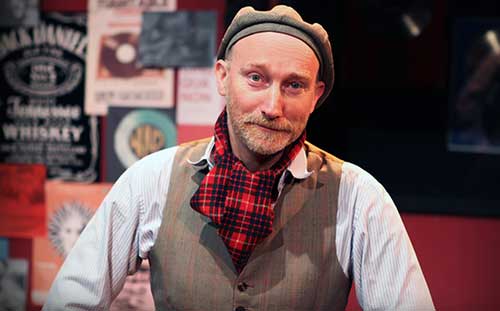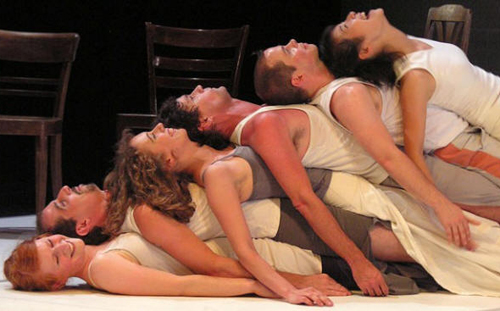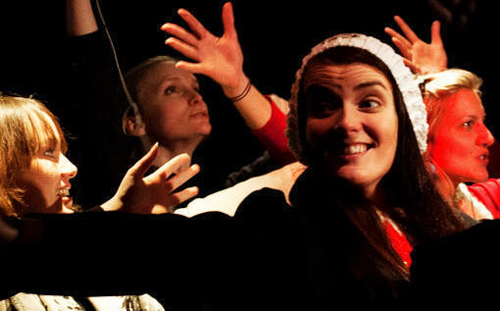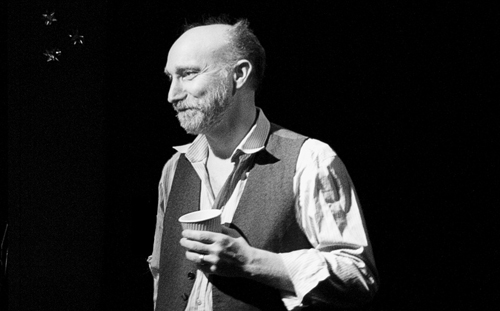
Jeremy Stockwell walks into the Young Vic cafe with purpose. Although we’ve never met before, there’s no dithering, he’s heading straight for me. A gentlemanly exchange and he’s off to order us coffee. There’s a fetching energy here before we start. I’m intrigued.
We’re here to talk about a new London drama school Stockwell has founded. Red Thread. Yes, you’d be forgiven for sighing into your cornflakes at the very thought of another actor training establishment being created in an already oversubscribed industry. But, I want to hear this guy out. Something indicates we’re not going down a traditional route here.
Stockwell has just finished working on a professional production at the Trafalgar Studios where he took on the role of movement director. His employer? An ex-student of his from RADA, Lily Bevan, who has done “very well for herself,” he grins, sipping his coffee. A neat turn of events gaining employment from one of his proteges, perhaps, but there’s more to working with Bevan, and those like her, that rouses excitement in Stockwell. “She acts, she writes, she directs, she produces,” he explains. “And that’s just the type of spirit I’m behind.”
There’s a twinkle in Stockwell’s eye that says this isn’t about a tweak here and there, this is a call to arms with a major change in approach
Stockwell is drawn to working with actors that “make and create, and come up with their own stuff,” he confides. “So many British actors don’t. But I think creating is where the joy is. We have probably the finest, or one of the finest, systems of training for the industry. We’re training actors very well, but I wonder if we’re training them to meet the needs of today.”
This industry, probably more than any other, is constantly evolving. In recent years, with acute cuts to the arts in general (thanks to the Tory’s) and a demise in the ‘golden-age’ of television drama (thanks to reality TV), there are less and less jobs out there for actors. But let’s not get into a political and social blame game here. The truth is, times have changed. The arts are almost always the first to be cut in any recession, history tells us that. Reality television is inexpensive to produce, millions watch it, whilst advertising revenue pours in. One, plus one, equals: “a lot of unemployed actors”. Quite.
And with more performers entering the profession than ever before, surely drama schools the length and breadth of the country are moulding their syllabus to meet today’s needs. Or are they? There’s a twinkle in Stockwell’s eye that says this isn’t about a tweak here and there, this is a call to arms with a major change in approach. The system in this country that puts students through training, development and into the professional world is “leaving actors out in the cold,” explains Stockwell.
So do we sit back and just accept it, or is there a way to warm those actors up? “There are many actors who are proactive and say, ‘you know what, I’m going to make my own stuff’. But how do they make it? How do they get it on? How do they produce it? How do they market it? Do they just do it in the UK? Can they not take it out to the rest of Europe and America? There’s a whole network out there.”

At this point, there’s no stopping Stockwell. He’s off like a runaway train, steaming toward it’s destination. “I may be wrong, but there’s not a school that does both things. That says ‘here we are devising, making and producing, this is the way you come up with your own work, writing it or not writing it even, but making it, and then how do you sell it, how do you get it on?’ We’re doing both of these things,” he smiles. The locomotive pulls into the platform. “That’s our USP.”
There’s a notable pause. I suspect I’m being urged to digest the ‘reveal’ in Stockwell’s pitch. ‘Pitch’ sounds almost corporate, and of course it’s not like that at all, far from it. This is a genuine passion, I can see that, and it’s a passion I want to explore more. I do wonder though, armed with their Unique Selling Point, whether Stockwell and his team will be attracting a niche group of performers, rather than the masses. It’s a cliche to say all actors are lazy, but do all actors possess that entrepreneurial spirit, for instance? “That’s a very good question,” he muses. “I think actors mostly, have a spirit, where they want to get on, and want to do it. I think actors are bloody hardworking.”
Stockwell makes the point that getting into drama school is tough enough. Thousands apply each year, competition remains fierce, it’s no easy feat before the training even begins. But it’s his reckoning that institutions, although some of the best in the world, are perhaps breeding “very passive students” no matter what the subject is. “When I work at universities, I hear students saying ‘is it alright if I give my own opinion?’ or ‘should I be trying to get it right?’ You know as well as I do, that artists are about making their own work and devising. How many times have you seen actors who are afraid to contribute? The actor, I think, has lost their potency. Well, not completely lost it, it’s still there, it’s just hidden.”
‘Are we losing a generation of creatives to the recession?’ And many of us in the industry, many key arts industry players, we say ‘of course we are’.
While Stockwell is keen to assert his belief that UK drama schools offer a wonderful level of training and that he is in no way “dissing” that traditional system he still aims to continue working in, he has brought his team together to show there is another way. Not only to guide actors in how to make and devise, but also to produce and structure a working company.
“It’s being able to do both and there’s the potency,” he continues. “There’s what makes a proactive and entreprenual actor. I think actors have that potential, because they can be bloody-minded, and they are artists. The word artist is not a word I hear too often at any drama school in the UK. So yes, is the answer to your question. Actors are entreprenual, they have a spirit and they want to do a very good job, and they know its tough, they really want to work. But they’re trying to work within an industry that only takes so much.
“The question being raised by many journalists is ‘are we over saturating the market with graduates, and just leaving them there?’ They’ve got all these skills, they’re hugely talented, they’re full of life, and get up and go, but they don’t know what to do with it.”
I’m suddenly reminded of my many talented peers who graduated with me in 2003. Good actors, some of them great. Only a handful now acting, of course, and not necessarily the ones you’d expect. This is nothing new. Stockwell agrees: “The question Martin Bright asks is, ‘are we losing a generation of creatives to the recession?’ And many of us in the industry, many key arts industry players, we say ‘of course we are’.”
He is referring to Martin Bright, the journalist who formed New Deal of the Mind in 2009, a coalition of artists, entrepreneurs, academics and opinion formers, working to boost employment in Britain’s creative sector during the recession.
Stockwell poses the question: “So what can we do about it?”
Let’s get into the nitty gritty of how this new school works then. A maximum of fifteen students will embark on a year’s intensive training of three terms, consisting of classes in acting, movement, voice and devising in the first two days of every week. In those primary days, students will be met by leading industry professionals regularly to learn from those out there actually doing it. As well as skills and production classes, students will be given rehearsal space on the remaining three days to put that expertise into practise, and with a given theme they’ll be creating theatre every week. Actors on the course will range from 18, with no set upper limit, but it is expected to be around 30 years old. Some students will have completed three years at a traditional drama school, for others this will be their first step into acting.
“I think each of them will have something the other doesn’t have. It’s about this collaboration, it’s about being able to mix with people,” explains Stockwell. “They get their skills, and it’s about how they use those skills.”
There’s talk of four-week intensives with students travelling to the Sussex countryside, for instance, where they’ll live, work, devise and show, with specific challenges set. The final showcase will be open to the industry, with theatre companies such as Complicite, Kneehigh and Hoipolloi being invited. These are companies that share the school’s ethos for making and devising their own work, such links Stockwell hopes to nurture from the outset.
“There isn’t a drama school like this,” says Stockwell. “We think we can offer something which is authentic, which is appropriate to this time, and which is affordable.”

Stockwell’s enthusiasm is infectious. I often ask, at the end of an interview, if there’s anything else the subject would like to share. I’m generally confronted with a ‘no, I think we covered it all’. It’s here Stockwell offers, perhaps, his most inspiring comments of all.
“All theatre is physical. Don’t forget, your body is your subconscious mind. The body never lies,” he says. “Rather than training actors to be good actors, I say to my students that we’re human beings. We suddenly say we’re actors and we have this actor’s way of talking, this actor’s physicality, and the actor plays a character. But I say forget about acting right now. Concentrate on good, clear, honest, dynamic, human communication. With your body, mind, voice, with time, space, presence. Just be aware of how you communicate within your environment, with other people. If we get the communication right, the acting and the character are going to fall into place, and then there’s the humanity, that’s in your acting.”
I smile and ask whether this zeal will be evident every day at the school. Stockwell’s face lights up further, if that’s at all possible. “Oh, you ought to see us at Red Thread when we’re sat around the table thrashing this stuff out,” he laughs. “There’s a lot of love in the air, a lot of passion. We’re creating an environment where our students can make and sell work, connecting them to a whole network of other actors, organisations, not just in the UK, but also abroad, so it becomes one big family, operating independent of the industry. It provides them with greater employability, and a greater personal and artistic ability.”
I have a feeling Red Thread’s actors will be more than just warm when graduating. They’ll be smoking hot. Inspiring stuff.
For more information on Red Thread, including admissions, visit
www.red-thread.org.uk

Be the first to comment